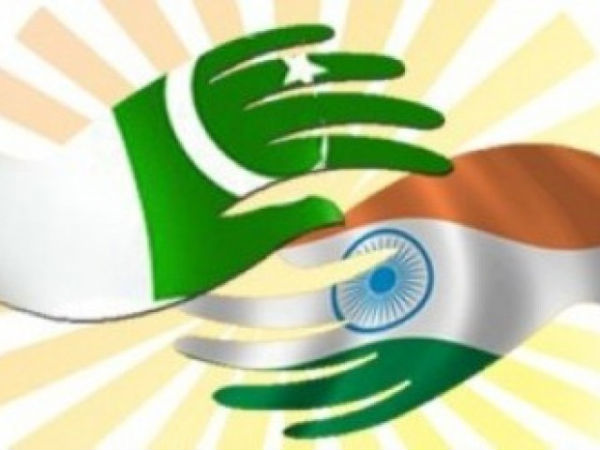India-Pakistan Dialogue:
India and Pakistan form the pivot of South Asia region and are increasingly playing a decisive role in global affairs. However, over the past six decades, gruelling poverty, misgovernance, political manipulation of religion, gender disparities and caste and ethnic conflicts have warped and wounded daily life of millions in both the countries.
Economic advancement has been blocked, and access to basic rights like health, universal education and employment remains unacceptably limited to those most in need. Elsewhere in the world conflicts have been encouragingly and bravely addressed, yet conflicts in of South Asia remain unresolved.
The history of India- Pakistan relations has led to a trust deficit between the two countries. However, in recent years there is growing number of citizen initiatives and exchanges taking place between India and Pakistan, among people involved in health, education, trade and business.
Despite some scepticism, all these initiatives have helped in making incremental progress towards normalising Indo- Pak relations. These initiatives are helping to strengthen cooperation at people to people and institutional level in the areas of mutual interest.
Recently India-Pakistan revived the Joint Commission. It has mandate to discuss 8 subjects - Agriculture, Education, Environment, Health, Information, IT & Telecom, Science & Technology, and Tourism. This provides scope for a wide cooperation between government as well as non-governmental Institutions/organisations.

To take advantage of these new openings, the Centre for Dialogue and Reconciliation (CDR) and the Lahore University of Management Sciences (LUMS) are jointly starting a one year pilot project. The project hopes to bring representatives of middle schools and Urban Environmental groups from Karachi, Mumbai, Lahore and Amritsar to share concerns, challenges and best practice experiments.
It is hoped that through the discussions and exchange of ideas, the participants will be able to evolve some ideas that can be implemented by them in their respective cities. It is also hoped that the schools and environmental groups would form their networks at the end of the year.
There would be three India Pakistan roundtable dialogues during the year in Mumbai, Lahore and Amritsar.
The project hopes to bring together educationists, and environmental experts and professionals and draw from their experience and expertise to evolve new ideas and recommendations. This project is replicable on a larger scale that can involve larger institutional collaborations between India and Pakistan. The multiplier effects of such partnerships can be very diverse and productive.
The project roundtable dialogues would focus on three major themes in education and urban environment protection. The deliberation will focus on issues of common concerns, challenges and exploring new opportunities that have increased relevance for both the countries.
1. Education
- Education is central for the development of the society and the growth of individuals. Education has come to face the challenge to inculcate in people the knowledge and skills for surviving trials of rapidly changing world.
- Discussions under this theme would be:
- Building Responsible Citizenship;
- Teaching strategies: new practices in teaching and learning;
- Use of Audio-Visual and Internet in Education
2. Urban Environmental Protection-
- Accelerated degradation of the environment and severe impact of climate change is severely affecting the communities in the urban centres of India and Pakistan, making an impact on people's socio-economic and cultural lives. To address and minimise these negative impacts, collective efforts are required involving experts, citizens, and governments. Discussions under this theme would entail:
- Wetland Conservation and pollution of water sources: mangroves & coastal areas, rivers, aquifers and rain water harvesting.
- Solid Waste management: garbage disposal, water quality, sanitation
Responsible Citizenship :
The project's focus on education and urban environment protection emerges from this perspective as the combination of schools and environment organisations hold the key for opening doors to citizen led effort for environment protection, and developing a cadre of responsible citizens.
Increased contact, bilateral trust and sustained dialogue among citizens, will build trust and generate an atmosphere of positive engagements among Indians and Pakistanis.
Pakistani Visitors
1. Mr. Syed Muhammad Ovais Yazdani , Director, White House Grammar School, Karachi
2. Ms.Sajida Rehan, Visiting Faculty, Reflections School, Karachi
3. Ms.Sarwat Baig, Principal, Genesis School, Karachi
4. Ms.Uzma Imtiaz, Headmistress, Beaconhouse School System, Middle-1, Karachi
5. Mr. Adnan Mobin, Deputy Director, Sindh Education Foundation, Karachi
6. Mr. Ali Khan Dehlavi, Project Manager, WWF Pakistan, Karachi
7. Mr. Sadaf Arshad , Research Officer, WWF Pakistan, Karachi
8. Ms.Sassi Memon, Project Officer, Climate Change adaptation Project-WWF Pakistan, Karachi
9. Ms.ZubedaYousuf,Executive Director, Trust for Conservation of Coastal Resources (TCCR), Karachi
10. Mr. Robert Whale, Director, Sindh Region, WWF Pakistan, Karachi
11. Ms. Fatima Iram Andaleeb Mohsin Ali, Senior Teacher, Lahore Grammar School, Lahore
12. Ms.Kaukab Malik, Senior Teacher, LACAS School System - Lahore
13. Ms.Maheen Qureshi, Assistant Program Manager, Idara-e-Taleem-o-Agahi, Lahore
14. Ms.Beena Manzar, Senior Education Committee member & Academic Coordinator, Sanjan Nagar School, Lahore
15. Ms.Munazzah Arif , Principal, Gulberg Girls Campus - Lahore
16. Mr.Ejaz Ahmad, Deputy Director General, WWF Pakistan, Lahore
17. Mr.Farhan Ahmad Butt, Vice President, Klimatech Environmental Club, Lahore
18. Mr.Kamil Khan Mumtaz, Founding Member, Lahore Conservation Society, Lahore
19. Mr.Rai Niaz Ahmad, Vice Chancellor, PMAS-Arid Agriculture University, Rawalpindi
20. Mr. Mir AnjumAltaf, Dean, Mushtaq Ahmad Gurmani School of Humanities and Social Sciences, LUMS, Lahore
21. Ms. Maryam Mohiuddin Ahmed, Project Coordinator, LUMS, Lahore
Press Release.



 Click it and Unblock the Notifications
Click it and Unblock the Notifications




























